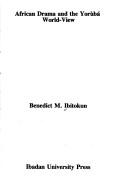| Listing 1 - 2 of 2 |
Sort by
|

ISBN: 9781212497 Year: 1995 Publisher: Ibadan : Ibadan university press,
Abstract | Keywords | Export | Availability | Bookmark
 Loading...
Loading...Choose an application
- Reference Manager
- EndNote
- RefWorks (Direct export to RefWorks)
Book
ISBN: 9042026812 9789042026810 9042026804 Year: 2009 Publisher: Amsterdam New York Rodopi
Abstract | Keywords | Export | Availability | Bookmark
 Loading...
Loading...Choose an application
- Reference Manager
- EndNote
- RefWorks (Direct export to RefWorks)
A poetic ‘voice’ scans the rhythm of academic research, telling of the encounter with odún ; then the voice falls silent. What is then raised is the dust of a forgotten academic debate on the nature of theatre and drama, and the following divergent standpoints of critical discourses bent on empowering their own vision, and defining themselves, rather, as counterdiscourses. This, the first part of the book: a metacritical discourse, on the geopolitics (the inherent power imbalances) of academic writing and its effects on odún , the performances dedicated to the gods, ancestors, and heroes of Yorùbá history. But odún : where is it? and what is it? And the ‘voice’? The many critical discourses have not really answered these questions. In effect, odún is many things. To enable the reader to see these, the study proceeds with an ‘intermezzo’: a frame of reference that sets odún , the festival, in its own historico-cultural ecoenvironment, identifying the strategies that inform the performance and constitute its aesthetic. It is a ‘classical’ yet, for odún , an innovative procedure. This interdisciplinary background equips the reader with the knowledge necessary to watch the performance, to witness its beauty, and to understand the ‘half words’ odún utters. And now the performance can begin. The ‘voice’ emerges one last time, to introduce the second section, which presents two case studies. The reader is led, day by day, through the celebrations – odún edì , Morèmi’s story, and its realization in performance; then confrontation by the masks of the ancestors duing odún egúngún (particularly as held in Ibadan). The meaning of odún becomes clearer and clearer. Odún is poetry, dances, masks, food, prayer. It is play ( eré ) and belief ( ìgbàgbó ). It is interaction between the players (both performers and spectators). It is also politics and power. It contains secrets and sacrifices. It is a reality with its own dimension and, above all, as the quintessential site of knowledge, it possesses the power to transform. In short, it is a challenge – a challenge that the present book and its voices take up.
Yoruba drama --- Mythology, Yoruba, in literature. --- Yoruba (African people) --- Yoruba drama. --- Yoruba literature --- History and criticism. --- Rites and ceremonies. --- Nigeria --- Nigeria. --- Bundesrepublik Nigeria --- Colony and Protectorate of Nigeria --- Federal Military Government (Nigeria) --- Federal Republic of Nigeria --- Federation of Nigeria --- Jamhuriyar Taraiyar Nijeriya --- Nai-chi-li-ya --- Naijeria --- Nigeria (Federation) --- Nigerii︠a︡ --- Nigerija --- Nigeryah --- Ọ̀hàńjíkọ̀ Ọ̀hànézè Naìjíríyà --- Orílẹ̀-èdè Olómìniira Àpapọ̀ Nàìjíríà --- Republic of Nigeria --- ניגריה --- ナイジェリア --- Nigerii͡ --- Ọ̀hàńjíkọ̀ Ọ̀hànézè Naìjíríy --- Orílẹ̀-èdè Olómìniira Àpapọ̀ Nàìjírí --- History.
| Listing 1 - 2 of 2 |
Sort by
|

 Search
Search Feedback
Feedback About UniCat
About UniCat  Help
Help News
News